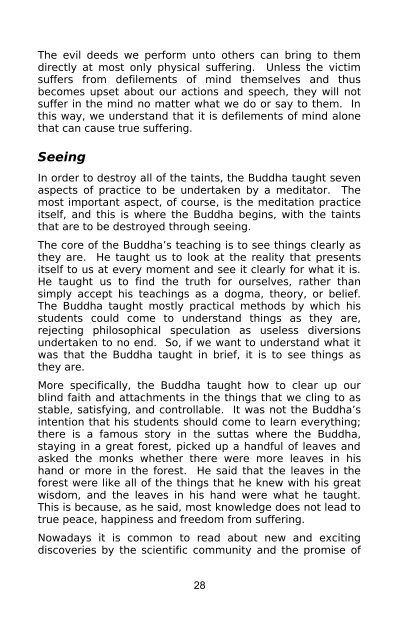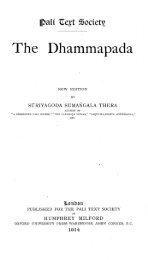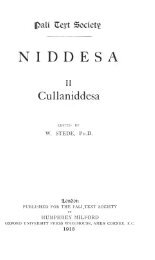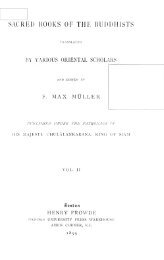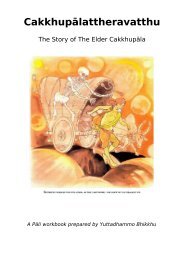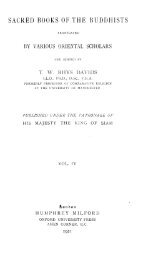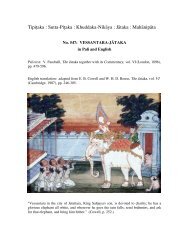Lessons In Practical Buddhism - Sirimangalo.Org
Lessons In Practical Buddhism - Sirimangalo.Org
Lessons In Practical Buddhism - Sirimangalo.Org
Create successful ePaper yourself
Turn your PDF publications into a flip-book with our unique Google optimized e-Paper software.
The evil deeds we perform unto others can bring to them<br />
directly at most only physical suffering. Unless the victim<br />
suffers from defilements of mind themselves and thus<br />
becomes upset about our actions and speech, they will not<br />
suffer in the mind no matter what we do or say to them. <strong>In</strong><br />
this way, we understand that it is defilements of mind alone<br />
that can cause true suffering.<br />
Seeing<br />
<strong>In</strong> order to destroy all of the taints, the Buddha taught seven<br />
aspects of practice to be undertaken by a meditator. The<br />
most important aspect, of course, is the meditation practice<br />
itself, and this is where the Buddha begins, with the taints<br />
that are to be destroyed through seeing.<br />
The core of the Buddha’s teaching is to see things clearly as<br />
they are. He taught us to look at the reality that presents<br />
itself to us at every moment and see it clearly for what it is.<br />
He taught us to find the truth for ourselves, rather than<br />
simply accept his teachings as a dogma, theory, or belief.<br />
The Buddha taught mostly practical methods by which his<br />
students could come to understand things as they are,<br />
rejecting philosophical speculation as useless diversions<br />
undertaken to no end. So, if we want to understand what it<br />
was that the Buddha taught in brief, it is to see things as<br />
they are.<br />
More specifically, the Buddha taught how to clear up our<br />
blind faith and attachments in the things that we cling to as<br />
stable, satisfying, and controllable. It was not the Buddha’s<br />
intention that his students should come to learn everything;<br />
there is a famous story in the suttas where the Buddha,<br />
staying in a great forest, picked up a handful of leaves and<br />
asked the monks whether there were more leaves in his<br />
hand or more in the forest. He said that the leaves in the<br />
forest were like all of the things that he knew with his great<br />
wisdom, and the leaves in his hand were what he taught.<br />
This is because, as he said, most knowledge does not lead to<br />
true peace, happiness and freedom from suffering.<br />
Nowadays it is common to read about new and exciting<br />
discoveries by the scientific community and the promise of<br />
28


